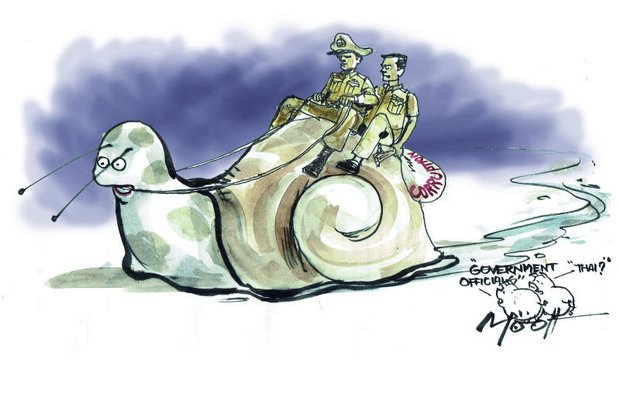
Nine, 67, 77 and 250 are numbers that gathered media attention and front-page leads in newspapers last week. No, I'm not talking about lottery number predictions. They are the numbers involved in the welfare funds corruption scandal as demonstrated in a report by the Public Sector Anti-Corruption Commission released last week.
Nine was the number of provinces cleared in the welfare corruption scandal. Sixty-seven was the number of provinces where corruption has been found; while 77 is the total number of provinces in Thailand and 250 was the number of officials and staffers at all levels at the Social Development and Human Security Ministry, suspected of having a hand in embezzling funds for the destitute, including HIV patients.

Anchalee Kongrut writes about the environment in the Life section, Bangkok Post.
At this point, I bet you might ask the same question that I did: Is it possible to stamp out corruption in Thailand at all? What has been missing from our anti-graft initiatives? Thailand has declared war on corruption many times -- and lost.
We have followed the good practices of others by trying to create anti-graft agencies. We have the National Anti-Corruption Commission (NACC) and the Public Sector Anti-Corruption Commission (PACC) to deal with graft. We have fine-tuned our anti-graft laws. We have launched awareness campaigns only to see a decline in morals. In the old days, corruption meant large kickbacks, bribery of bigwigs, politicians and their cronies. But now, in the Thailand 4.0 era it has reached grassroots and SME level -- low- and mid-level government officials who discreetly pocket money from poor peasants, HIV patients and scholarships for poor students.
What is so wrong with our country, with us?
I believe one thing has been missing from the wars against corruption -- real public participation that includes ordinary people, plain folk like you and I.
The role of the public in fighting corruption is indeed limited. The war against corruption has been the job of state agencies such as the NACC and PACC. Citizens like you are I are asked to stay on the sidelines, to watch out for corruption and report it to the authorities.
But what happens after? What happens if the state refuses to follow up on a case or buries one after the media and public attention subsides? What can ordinary people like us do?"
Not much, I am afraid. Once you lodge a corruption complaint, the ball is in court of the state and the judicial process will take years.
Some whistle-blowers get their voices heard while many are just whistles in the wind. Dawan Chantarahasdi, a community leader who managed to expose the corruption in the Klong Dan wastewater treatment plant in Samut Prakan, told me the lawsuit launched more than a decade ago is still ongoing.
Ms Dawan is a rare individual. She is an ordinary citizen who has devoted her life to fighting the graft tainting the project which would adversely affect her community.
She is aware of the risks in exposing it. Scores of activists have been killed battling corruption in their communities.
"It is incredibly hard to fight against corruption in Thailand. The state should make things easier for people like us to participate in this. The state should make fighting corruption a people's affair," she said.
Looking at the structure of our graft-busting agencies, you will see fully fledged bureaucracy. The NACC or PACC staffers are manned by civil servants and many are appointed. The whole anti-corruption focus in Thailand is centred on law enforcement handled by police, attorneys and dyed in the wool government employees.
But there are good examples in other countries that show giving the public a greater role in fighting graft benefits anti-corruption initiatives.
According to a 2014 Princeton University study of successful anti-corruption organisations in eight countries, one of the reasons Indonesia's anti-grant agency has gone from strength to strength is its open-door recruitment policy that allows people who are not civil servants to join. Ghana's anti-graft body chose to look to civil society in its anti-graft initiatives. Botswana and Indonesia have engaged with youth groups and students to build awareness of corruption in society.
Thailand has spent decades losing wars against corruption. We have let men in uniform do the job. These men in uniform have been catching thieves who appear to wear similar uniforms to them for a long time now. Perhaps it is about time to let ordinary people play a more direct role in anti-graft missions.
